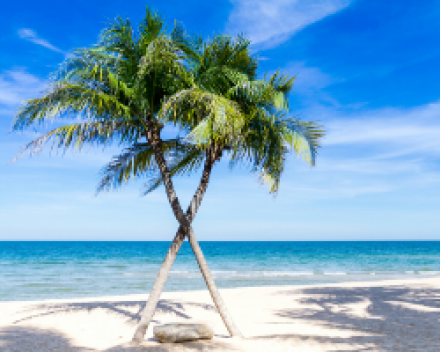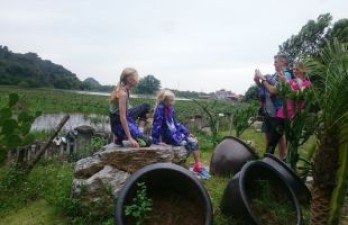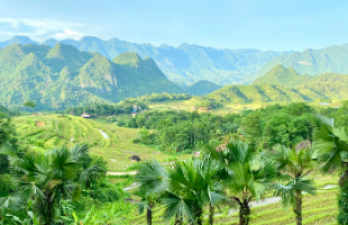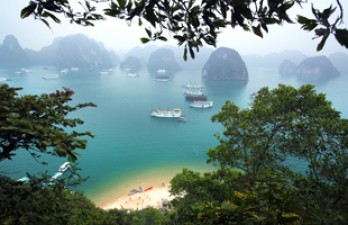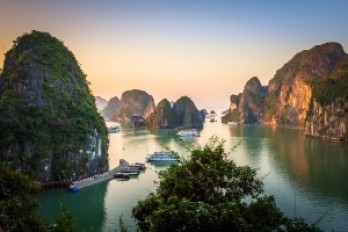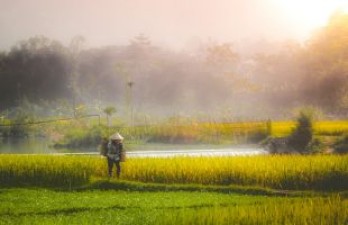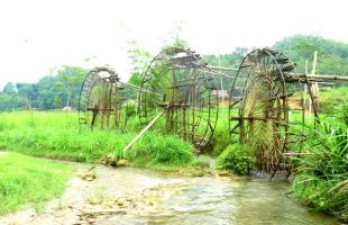Up to the call of Mai Hich and Mai Chau
2By Ha Nguyen- Tour guide
Ha has been guiding our guests for almost 20 years. Born and raised in Hanoi, Ha is fascinated about the mountains and the hill tribes' culture. He shared the story about this first solo trip some twenty years ago to one of his favorite destinations: Mai Hich village in Mai Chau.
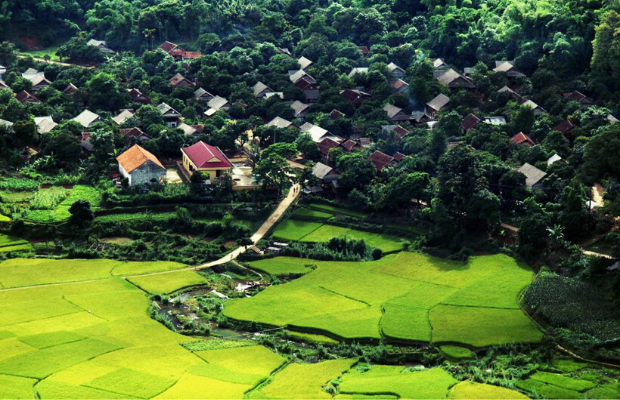
A beautiful village in Mai Chau valley
In my childhood, I went to school to learn what was beyond my "windows". My school was a communist one where everything was so communist, from the chairs against one of which I rubbed my bottoms to the very subject, which bored me the most – poetry. I had to learn by heart quite a lot of poems and then read them loudly to my class as if 'I was a cicada'. I did not enjoy them at all because there was too much propaganda. But one of the poems that I learned when I was 15 has impressed me:
- Roaring tigers playing with men
- Thatched houses looking like a pack of tortoises standing in the sun
- Green undulating rice paddies
- Curtains of mist hanging down from the sky over a vast ever-green canopy
- Lullabies by meandering brooks
- White Thai women with embroidered clothes on giggling somewhere Flocks of butterflies seeking beauty from flowers.
(Simplified from 'Marching to the west' by Quang Dung).
It was for all this that I marched to the land called Mai Hich, a small secluded village near Mai Chau.
Early in the morning, leaving dust, noises, and worries from the city life behind, I travel with my travel mate: a Honda motorbike. It took me to a way that went straight to the outskirts of Son Tay where I visited the old citadel dated back in the 19th century. I also visited Duong Lam ancient village with old houses built by red laterite. This area was the homeland of the soldiers mentioned in the poem. As I traveled towards the west on National highway 6, I imagined myself as one of them, leaving the city behind and reaching the mountains. The road was getting smaller and more winding, but the scenery was impressive. I enjoyed the idyllic landscape around: green rice and cornfields, beds and trellises of tropical vegetables, red clay hills covered with bushes and forests. This place was where young men were training. Time was flying.
I arrived at Thung Khe (White Rock Pass), where I stopped to view the most significant power plant in the north of Vietnam in the 1990s. I passed by Cao Phong, featuring fields of purple sugar canes and hills of sweet oranges. I stopped at Muong Khen, showing crowded herds of buffalos soaking themselves in the mud. It was not midday yet. The engine of my bike was scorching, and it wanted a break. I had not taken my breakfast since departure, so I decided to call at a simple hut to the right side of the way. A woman opened the door with a smile, saying some words in her strange tone. I realized she was not a Viet but a hill-tribe that had been living here from the cradle to the grave, the Muong. I walked in, and to my surprise, the hut was not like any others that I had seen before. It opened into the open air from its back door, from which I managed to admire a vast and deep valley and catch some fresh wind blowing up from below. What a grand award for me after miles of wheeling!
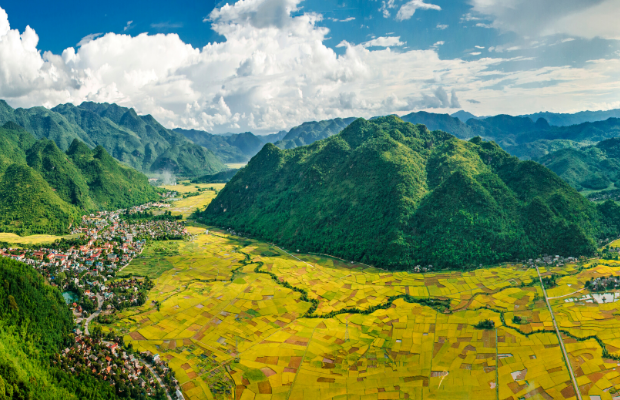
The view of Mai Chau from Thung Nhuoi Pass.
The old lady offered some boiled chicken eggs with a little salt mixed with dried wild pepper powder. She also gave me some young sweet corn. They were good. I said goodbye to the friendly women and continue my journey to the west. As I passed a big hill, the scenery changed to a range of karst formation. It was broad, deep, green, white, brown, ragged just like the big mouth of a big monster in a particular movie I had watched somewhere. The mountain view has been awe-inspiring. I later learned that the mountain here named Thung Nhuoi.
As I started going downhill, an open valley appeared incredibly beautiful below. I stopped my bike on the side of the road. I was standing dead; it was breathtaking scenery. I saw with my own eyes the real beautiful Mai Chau valley. It was even more beautiful than I imagined. The small villages nestled in the foot of the mountains surrounding the valley while the rice fields stretched throughout the valley. I took a thousand pictures of the valley from this spot.
I drove downhill and turned left to Mai Chau valley, passing the town and drive along the scenic road through the valley. The ripening golden ricefields in October were amazing. I reached Mai Hich village at noontime. It was a small village of the Thai hill tribe with only about 20 houses. Like all other villages in Mai Chau, they lived in their traditional houses on stilts. With pre-arrangement, I was welcomed by the host family, Mrs Tho, where I planned to stay overnight. Her home was on the edge of the village with a view directly to the rice fields. I spent my afternoon walking around the hamlet, visit several families. After dinner, I was able to join the locals to sing and dance. Dancing with bamboo sticks was very interesting for me. I went to bed very late after one of the most beautiful days of my life.
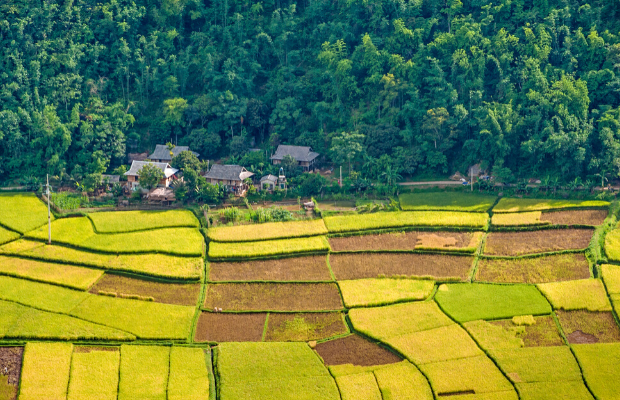
Mai Hich village in Mai Chau.
It was my first solo trip and I couldn't be happier. I was in Mai Chau, the place that was always in my mind since I first read the 'Marching to the west'. I met the most lovely people on the way and in Mai Hich, those with warm hearts. They showed me their beautiful village, cooked for me delicious food. I also admired their rich and unique culture. A short time after this trip, I graduated and worked as a tour guide, the job that I enjoyed so much, and I am still doing it now. It was 20 years ago. Mai Chau now is a popular tourist destination, and Mai Hich village is one of the leading community-based tourism sites in the Northwest of Vietnam. I return to this village often and now become a good friend of Mrs Tho family. Her son, Mr Minh, is running a homestay that Handspan Travel is using for our guests. One day, I would like to take you there, show you this gorgeous Mai Chau and Mai Hich. I am sure you will enjoy this place as much as I did on my two-day trip that changed my life.
__logo.png)
__hanoi-water-puppets.jpg)
__angkor-wat-blue-reflections.jpg)
__vientiane-buddha-park-monks.jpg)
__bagan-dhammayazika-dusk.jpg)
